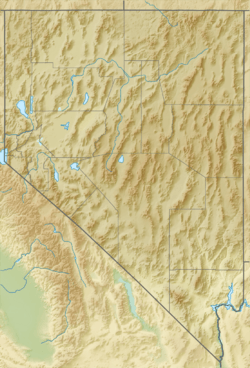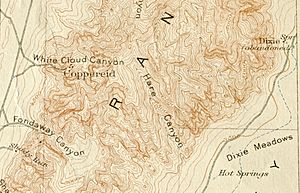Dixie Valley, Nevada facts for kids
Quick facts for kids
Dixie Valley, Nevada
|
|
|---|---|
|
Ghost town
|
|
| Country | United States |
| State | Nevada |
| County | |
| Elevation | 3,435 ft (1,047 m) |
| GNIS feature ID | 856015 |
Dixie Valley, Nevada, was once a small town in Churchill County, Nevada. It was mainly a ranching area, meaning people raised animals like cattle or sheep. In 1995, the US Navy bought the land for a training area called the Fallon Range Training Complex (FRTC). After this, the town became a ghost town.
Life in Dixie Valley was quite isolated. There were no shops or stores. Neighbors often lived more than a mile apart. The town had a one-room school for students in grades 1 through 8. This school building also served as the teacher's home and a place for town meetings, dances, and elections. Older students (grades 9-12) had to travel 75 miles by bus to Fallon, Nevada for school.
The town of Dixie was started in 1861 at the top of Dixie Valley. It was named by people who supported the Southern states during the American Civil War.
Today, there is a geothermal power plant in Dixie Valley. This plant uses heat from deep inside the Earth to make electricity. It started in 1988 and can produce 66 megawatts of power. About 30 people work there. The plant uses 12 wells to bring steam from underground and about 24 wells to put water back into the Earth.
Powerful Earthquakes in 1954
On December 16, 1954, two very strong earthquakes hit Dixie Valley. They happened only four minutes apart. These quakes are known as the Dixie Valley–Fairview earthquakes.
Both earthquakes were extremely powerful. The first one measured 7.3 on the moment magnitude scale, and the second was 6.9. The shaking was so strong that it was rated X (Extreme) on the Mercalli intensity scale. This scale describes how much people feel an earthquake and how much damage it causes.
Even though the quakes were very strong, they caused little damage to buildings. This is because very few people lived in the area at the time. However, the ground itself changed a lot. The movement along a fault created large cracks and steps in the Earth's surface called fault scarps.
See also
 In Spanish: Dixie Valley (Nevada) para niños
In Spanish: Dixie Valley (Nevada) para niños




